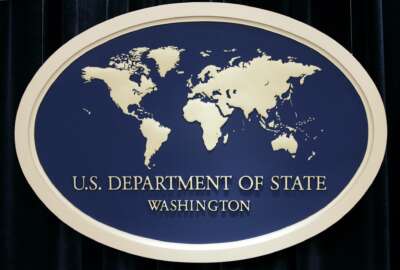To listen to the Federal Newscast on your phone or mobile device, subscribe in PodcastOne or Apple Podcasts. The best listening experience on desktop can be found using Chrome, Firefox or Safari.
- Diplomats and intelligence personnel suffering from a mysterious illness called Havana Syndrome could get additional support from a bill introduced by 15 senators. The HAVANA Act would authorize the CIA and State Department to offer additional financial support to employees suffering from brain injuries. Both agencies would have to set up criteria for payments and report to Congress if more action is needed. The condition first emerged in 2016, with 40 U.S. embassy staff in Havana reporting dizziness, tinnitus, visual problems, vertigo and cognitive problems. Those same symptoms have since been reported by personnel in China and other overseas posts.
- Five industry associations are pushing Congress to increase the fiscal 2022 budget of the Cybersecurity and Infrastructure Security Agency by $750 million. In a letter to House and Senate appropriations committee leaders, the industry groups said without this increase CISA will struggle to meet goals like offering cyber shared services, accelerating the CDM program and helping agencies move to a zero trust architecture. The associations said the one-time $650 million increase in the American Rescue Plan Act is helpful to address immediate needs, but this new increase would help with long term challenges.
- OMB is planning to give a boost to the 21st Century IDEA Act. Agencies will receive updated guidance in the coming months for how to make sure public facing websites meet the needs of citizens and businesses. Federal CIO Clare Matorana said yesterday that the Office of Management and Budget will reengage more specifically on the requirements of the 21st Century IDEA Act passed in 2018. Matorana said she wants agencies to provide a 360-degree omnichannel experience for citizens that is digital first, but not digital only. She said it’s important for agencies not to leave any citizen behind as they modernize and simplify services.
- Congressional Republicans are reviving an effort to divest the Thrift Savings Plan from Chinese companies. Sen. Tommy Tuberville (R-Ala.) introduced the Prohibiting TSP Investment in China Act. The bill would accomplish what the title suggests. Rep. Jim Banks (R-Ind.) plans to introduce a companion bill in the House. A bipartisan group of senators introduced similar legislation in the last Congress.
- The House passed 10 veterans-related bills earlier this week. One lifts an arbitrary cap on the number of equal employment opportunity counselors at the Department of Veterans Affairs. Another bill changes the way VA handles and investigates workplace harassment and discrimination. It also reorganizes VA’s equal employment opportunity function to limit potential conflicts of interest. And a third bill requires VA to report to Congress on how it’s spending emergency COVID relief funding.
- The Veterans Affairs accountability office said it’s improved in recent years, but whistleblowers aren’t so sure. The VA accountability office issued 99 recommendations to senior leaders and supervisors last year. But VA only took disciplinary action against half of them. Whistleblower advocates and members of Congress said that’s still a problem. “Trust is hard to build and easy to lose. And VA has a lot of trust building to do after the last four years,” said House VA Committee Chairman Mark Takano (D-Calif.) (Federal News Network)
- The best shot for Congress to pass comprehensive postal reform legislation just got better. Twenty senators introduced companion legislation to a postal reform bill headed for a vote on the House floor. The Postal Service Reform Act, if passed, would be the first major piece of USPS legislation in 15 years. It saves the agency nearly $46 billion over the next 10 years by eliminating a 2006 mandate to prefund retiree health benefits. Senate Homeland Security and Governmental Affairs Committee Chairman Gary Peters (D-Mich.) and Ranking Member Rob Portman (R-Ohio) introduced the legislation. (Federal News Network)
- The Postal Service named a new vice president for corporate affairs to lead industry engagement with the agency’s 10-year reform plan. Judy de Torok will take on this new role, and will oversee the offices of Industry Engagement and Outreach, National Preparedness, and International Postal Affairs. De Torok has had a 25 year career with USPS and previously served as the manager for industry engagement and outreach.
- IRS Commissioner Chuck Rettig says the agency will continue to struggle to staff up amid an increased workload. “It will take time to overcome the challenges of the past and the agency will continue to struggle to replace more than 50,000 workers lost through attrition over the next six years,” Rettig said. The IRS lost 33,000 employees to attrition since 2010, and had its budget cut by 20% over the same period of time. The Biden administration is calling on Congress to boost the agency’s budget by $80 billion over the next 10 years to shrink a growing tax gap between what taxpayers owe and what the agency collects.
- The pandemic changed the way the government thinks about telework, but the Air Force is one of the first agencies to put those changes in writing. A new 27-page guidance document the service issued this week lays out new expectations for how to manage military members and civilians who might work remotely on a longer-term basis. For example, full-time teleworkers will get their locality pay based on the actual location where they work – not where their unit is based.
Copyright
© 2024 Federal News Network. All rights reserved. This website is not intended for users located within the European Economic Area.
